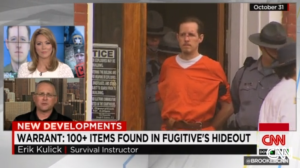True North on CNN
After spending forty-eight days on the run after gunning down two Pennsylvania State Troopers, Eric Frein, an apparent “expert survivalist,” was finally arrested by U.S. Marshalls on October 30 at an abandoned airplane hanger in northeastern Pennsylvania. Since then, law enforcement and media alike have been working hard to determine how Frein not only committed the crime, but how he was able to remain on the run for so long. In as much, I continued to be interviewed this week by various journalists from such news organizations as The Morning Call, The Philadelphia Inquirer, and CNN who asked for some insight into Frein’s survival abilities.
In fact, on Thursday, I was privileged to be interviewed live by CNN anchor Brooke Baldwin on her show Newsroom. You can watch it for yourself as part of her report, “100+ Items Found at Frein’s Hideout.” You can also read the transcript:
BALDWIN: If you do not need a passport to access your own Wi-Fi one day, your unsecured account could actually help a fugitive wanted for murder.
That’s what a search warrant revealed about Eric Frein, who was on the run for 48 days after he allegedly shot and killed a Pennsylvania State Trooper back in September and severely injured another. The just-released warrant says this about Frein — quote — “He had used the laptop to access the Internet using open Wi-Fi accounts while he was evading authorities.”
So, this guy, as it turned out, had Wi-Fi. The court documents also show he was not only well-informed, but he was well-equipped. He had 100-plus items found in this hangar where Frein was apparently hanging out before Pennsylvania State Police nabbed him back on October 30.
When you look at this long list here, as I have, a couple of the highlights, solar converter, New Testament songs and proverbs, cup of noodles, empty plastic water bottles, bottle of hydrogen peroxide — just some of the items here.
Joining me now, survival instructor Erik Kulick.
Erik, thank you so much for coming on.
You know, you are a survival instructor, but, as it turned out, it wasn’t quite the situation that so many people assumed, that he was surviving in the woods.
ERIK KULICK, SURVIVAL INSTRUCTOR: No, certainly not, Brooke. I know during the hunt and after he was arrested, he’s been referred to as an “expert survivalist,” and, frankly, I cringed at the term. I thought it was really nonsense all along.
BALDWIN: What about the fact that he had Wi-Fi? That’s one way he
could have been clued in as far as where police were when they were looking for him.
KULICK: I can understand it, I guess, in his particular situation. There are seven survival priorities in any kind of wilderness setting or emergency like an urban disaster. Signal is what you would refer to that in terms of being able to reach out and make contact.
Certainly, in his case, he didn’t want to make contact, but it was a way to keep tabs on the police and help his escape. So, in that sense, I can understand it.
BALDWIN: Sure. And then when you look at this list, we pointed out some of it, compass, ThinkPad, firm grip gloves, green camo mesh, tarp, et cetera. How long — given all of this that was found with him in that hangar, how long do you think he could have lasted?
KULICK: I don’t really think he could have lasted much longer. When he started this, it was summer. Quickly moved to autumn and at this point it was quickly moving into winter.
He wasn’t prepared at all for spending a long time in the mountains, particularly in the winter. Even the gear he had, clothing and blankets, were really nothing he would need to put up with the cold, and that would quickly break him down, I would think.
BALDWIN: Erik, was there any one item that really struck you as, I don’t know, odd?
KULICK: I thought the whole mix of items was somewhat odd.
It was sort of a poor choice. In one sense, they helped him last this long. There’s no denying it. But it certainly wasn’t anything along the lines of what a so-called expert survivalist would use to survive long-term in the woods. For example, water, he had water jugs, was carrying water.
Why he wouldn’t have had a water pump or purification tablets, something as simple as that, somewhat surprised me.
BALDWIN: You would know as a survival instructor. Erik Kulick, thank you so much for the time. I appreciate you taking the time to speak to us
KULICK: Thank you.


